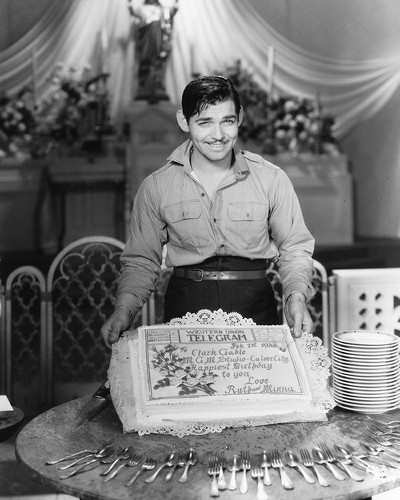
Happy Birthday, Clark Gable

William Clark Gable was born 119 years ago today, February 1, 1901. He was born at 5:30am to Adeline “Addie” Hershelman Gable and William Gable in their second floor apartment in Cadiz, Ohio.
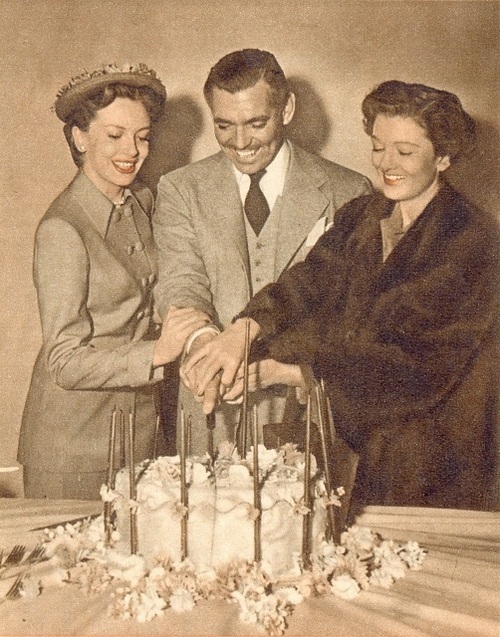
To celebrate this year, I’m doing fan requests on our Instagram and Facebook pages, followed by a complete bio on Clark that will come out in increments over several days.
Here on the website, there are four new articles:
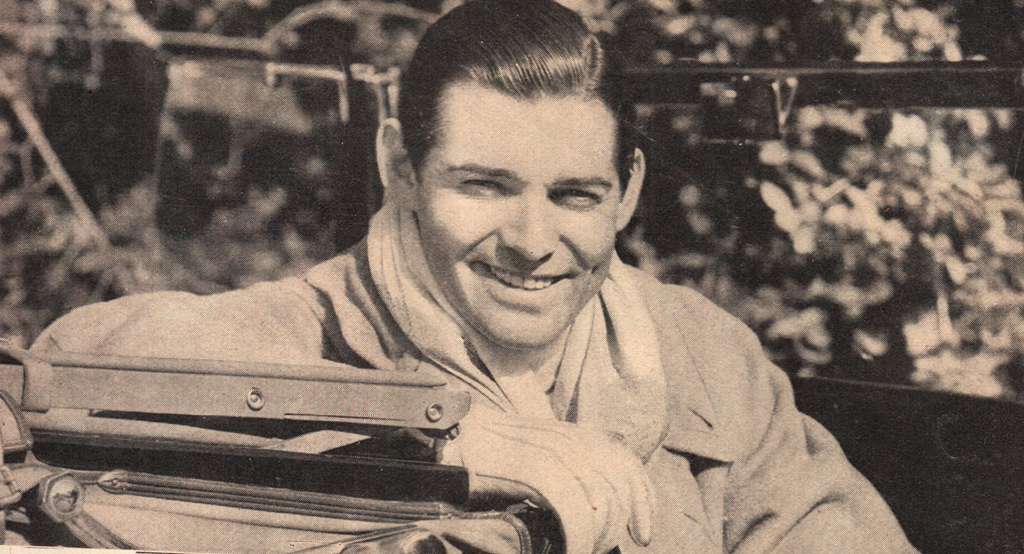
First off, we have a bit of a dud from Clark’s early career, What the Future Holds for Clark Gable, written in 1932 by Modern Screen magazine’s in-house astrologer. This article is completely showing its age. Can you imagine People or In Touch or Entertainment Weekly posting a lengthy article written by an astrologer saying what’s in store for a certain star? No, because it’s tedious and pointless. But in the 1930’s, astrology was taken very seriously. Just about every fan magazine had an astrologer on hand who would predict things for the stars (that were wrong 80% of the time that I’ve seen). Typing this, it might have well been in Japanese as I got nothing out of it. See for yourself:
He is a born actor, for his natal Sun position is in the fifth house of his horoscope, and the fifth is the location of, or the source of, most of the influences that attract men and women to a theatrical career. There’s a tip for you, if you were born between the approximate ours of 8 and 10 pm, for that is the time of day, every day in the year, when the Sun is in the fifth house. Of course, there are other influences that can be in the fifth division of the heavenly circle; the Sun is by no means the only one, for many successful screen stars were not born at this time of the evening. If you ever work out your horoscope, study the fifth house carefully if you have aspirations toward success in screen work.
The most striking thing about this horoscope of Gable is the conjunction of Neptune, the planet of the Movies, with his mid-heaven—similar to the horoscopes of Robert Ames, Joel McCrea, Ronald Colman, Ben Lyon, Charles Farrell, and Ralph Graves. This position instantly shows that its owner could do well in connection with the celluloid industry, although we must look elsewhere for the evidence of ability to perform before a camera and mike. In comrade Gable’s case, this is seen in the position of the Sun in the fifth. But there is even more to it than that: Mercury, the mental planet, is not only his ruler (because it rules the sign on his Ascendant) but it is also the ruler of his tenth (occupation and position before the public for fame and reputation) and the ruler of the sign (Gemini) in which we see the planet Neptune when he was born. This links his true temperament (external expression and what others see of him) to the work he is now doing.
You who have been reading my comments on the horoscopes of screen celebrities in these pages will recall that I predicted a few years ago a great advance in the movies, a literary advance. Well, we have seen this advance, at least the beginning of it, for we certainly are getting a bigger percentage of well-thought-out and well-directed film fare. The basis of that prediction was the present (then to be) position of Neptune in Virgo. Now notice how actors, and others who make pictures for our entertainment, who have Neptune and Virgo prominent in their nativities, make this prediction come true.
What the heck does any of that mean and how would any fan of Gable’s find this information useful. And too bad for Clark, because he wasn’t born at the proper minute to ever be a male hero:
So far, we have seen him mostly in stories where the main part was that of a woman, and there is evidence in this horoscope that he should do this as much as possible. If, however, he was born fifteen minutes after nine o’clock in the evening, he could be starred as the male hero and would go over to a great success with fans. This is a large if, and his producers would do well to make sure of his exact moment of birth, for the point is a delicate one.
That is beyond silly. It’s also quite ludicrous when you consider that Clark was born at home in 1901, so I doubt that the exact moment of his birth was recorded 100% accurately. Somehow, despite him not emerging into the world at the correct minute, he managed to play male heroes quite successfully anyway. You can read it all here.
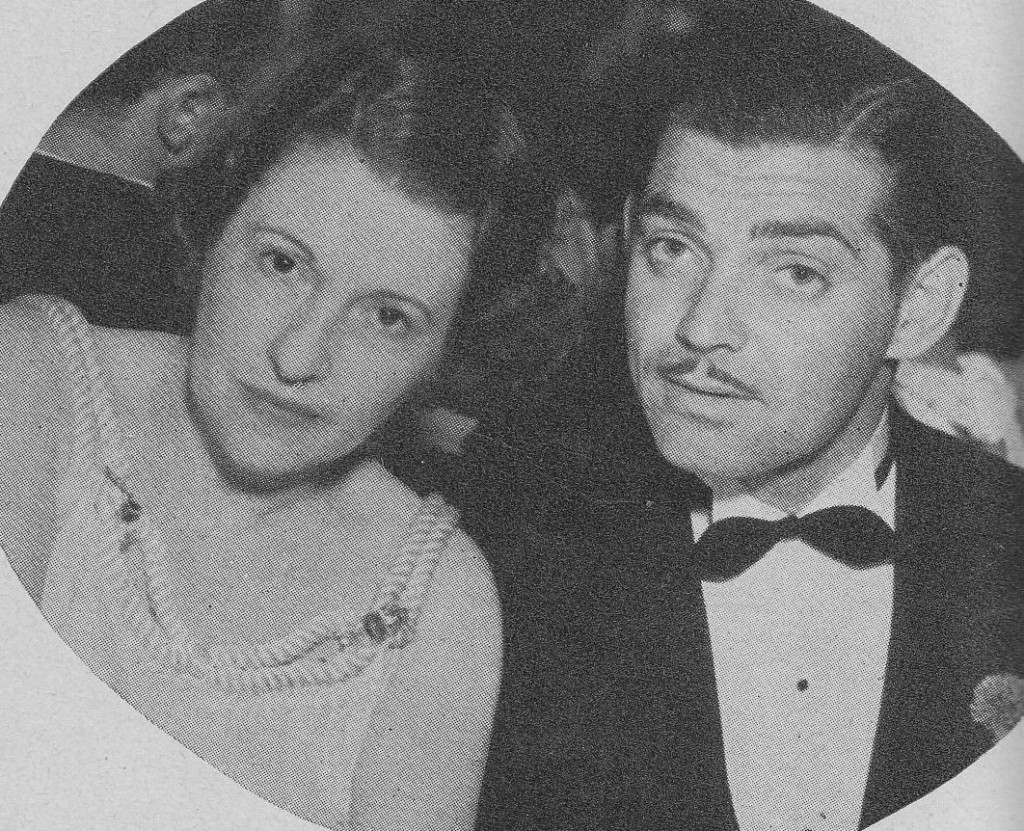
Now we skip ahead a few years to 1935, when Clark Gable was a bonafide movie star. At this point, he’d been married to second wife Ria for about four years and had been faithful to her for about four seconds during that time. Clark had been running around with Joan Crawford and Elizabeth Allan, just to name a few, and MGM was getting tired of having to squash rumors that Clark and his wife were anything but happy and in love (one glance at their body language at any event gives it away, but nonetheless…) So here comes Modern Screen magazine, with a piece assuring us all that the Gables are happy–Why I Stay Married. This is such an obvious publicity piece; I doubt that Clark was even interviewed.
I said to Clark, over the luncheon table, “What kind of a woman do you think an actor should marry? In order to make marriage successful, I mean?”
Clark said, without an instant’s hesitation, “The kind of woman I am married to—my wife.”
We had been talking about Hollywood marriages and their failures and the why of their failures—Kay Francis and Kenneth MacKenna, Ruth Chatterton and George Brent, Ann Harding and Harry Bannister, Gloria Swanson and her exes, Jean Harlow and Hal Rosson, the sadly swelling list of them.
Can you imagine Clark sitting around with a reporter gossiping and discussing other stars’ marriages and why they failed? Me neither.
[Clark said:]“I could not, I would not, be married to an actress. In the first place, one professional ego is enough in any home. Two egos of the same stamp would blow the roof off Buckingham Palace. If I were married to an actress, and I never will be, here is what would happen: We would have a bad day, each of us. We would come home with nerves frayed and teeth one edge and we would want to talk about it; we would want peace and comfort and sympathy. We wouldn’t get it, either one of us. And all hell would break loose. In the course of many times like this one or both of us would look for comfort and sympathy elsewhere. Or we would have a good day in the studio and would be full of it, wanting an admiring and appreciative audience, eager to do a little strutting, a bit of boasting. We would both want the floor, in other words.”
Well, that tune would sure change in just a few short years, wouldn’t it now? The logic there doesn’t make sense at all. But like I said, I don’t think much of this came out of Clark’s mouth.
[Clark said] “And I just wouldn’t be married to an actress neither would I be married to some sweet young thing, many years my junior, even though she were a non-professional and stayed at home. A younger girl could not know what it is all about. She would not be able to cope with the difficult and trying life of an actor’s wife in Hollywood. Because wives in Hollywood are on a spot and don’t you forget it. A young girl would be jealous. She would be suspicious. She would be resentful. Resentful of all the limelight flattery shown me. She would, at least subconsciously, crave the same flattery, the same attention for herself. She would be an easy victim of all the well-meaning ‘friends’ who would come to her and say, ‘My dear, I think you ought to know, Clark and that So-and-So, etc., etc.“Things like that do happen. Ria had a lot of it to put up with during our first year in Hollywood. Any number of people came to her with little tales calculated to prove that I was stepping high, wide and handsome with this one or that. I was going here, I was going there, I was having an affair with a certain star…did she know…what did she intend to do? It was rather hard for her, just at first. It takes a good deal of adjusting. And only because my wife is a balanced, sane and wise woman did she survive.”
Ria was indeed confronted with such rumors (most of them true) even before they got married. And I doubt they had many conversations about them, as they slept in separate bedrooms and he came and went as he pleased. What’s rather funny is that when this article was published in March 1935, Clark was up in the snowy mountains with Loretta Young having an affair and had conceived a baby. Because of this, Clark swiftly left Ria for good that fall and moved into the Beverly Wilshire Hotel. Although they would not divorce until 1939 (when Ria was paid off so Clark could marry Carole Lombard), they never lived under the same roof again after that. You can read the article here (and yes, it does just end abruptly–that was the way it was written, oddly enough).
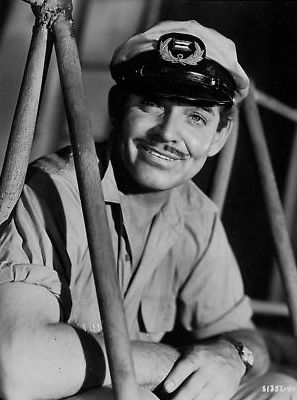
Next up, we have a quite lengthy (5,781 words and took up 14 pages in the magazine, but who’s counting) article from 1945, simply called Clark Gable. This was written when Clark was returning to the screen after spending a few years in the Army Air Corps. I don’t know why they felt the need to tell Clark’s life story in a long, rambling magazine article at this point and for some reason it focuses mostly on his pre-movie days, then rushes through his stardom, marriage to Carole Lombard, etc. It does offer a very concise re-telling of Clark’s early days acting in the theater. These events are often mixed up, because Clark came to Hollywood at once point, did some extra work, then went to New York, then back to Hollywood where he was “discovered.”
(1925) A day’s work here and there. Soon Clark felt sure that the movies were not for him. He began to think of New York, where plays were produced. But for New York, again one needs money. Louis MacLoon was about to present Jane Cowl to Los Angeles in “Romeo and Juliet.” The call went out for tall men to play the guards of Verona. Being six foot one, Gable was hired. Through the twelve-week run, MacLoon watched him. He was getting ready to produce “What Price Glory?” One of the characters, Sgt. Kiper, was described as lean and hungry-looking. Clark was lean and hungry-looking. The producer offered him the job.
His first speaking part on a professional stage. That was fine enough. Yet finer things were to come. MacLoon proved his good angel. When Sgt. Quirt gave notice, he said, “Like to play it, Clark?” All through Clark’s opening performance, he stood in the wings, coaching, encouraging. When the curtain fell, he said: “You’ll do, my boy.”
Gable stayed with him till the end of the season, appearing in six plays. One was “The Copperhead,” with Lionel Barrymore. Like Josephine Dillon, Barrymore found qualities in Gable that promised well. The two became friends—a friendship that was to bear fruit.
Meantime Clark took a job as second lead with a Texas company. Again, the leading man left, again the newcomer stepped in. Earning two hundred a week, he saved most of it. Then back to Los Angeles to seek MacLoon’s advice—
“What do you think of my going to New York?”
“I don’t have to think. Go while you’ve still got money in your jeans. Or you’ll never get there—”
Josephine went with him. They’d been married almost four years, not too successfully. For months they’d been drifting farther and farther apart. This was to be their final try together. It didn’t work out. Early in ’29, Clark’s wife returned to Los Angeles and filed suit for divorce.
To Arthur Hopkins, he presented a letter of introduction from MacLoon. He made no effort to impress Mr. Hopkins. With complete candor, he unfolded his odyssey, including the milkboats. The producer cast him as the Young Man in “Machinal.” He might have done worse. “Young, vigorous and brutally masculine,” said one paper. “Plays the casual, good-humored lover without a hackneyed gesture,” said another.
Play followed play. In none did he create a sensation, but work came without too much difficulty. He liked New York and had ceased to give the movies a thought. Had the offer from MacLoon come at another time, he might have refused it. But in May, the New York season was over. “Will you come out to play Killer Mears in ‘The Last Mile?’” MacLoon had wired. A fine part in a fine play. And he owed MacLoon a lot…
He owed MacLoon still more when the curtain fell on opening night. The audience had cheered. The Hollywood which had ignored him now sang his praises. All the studios wanted to test him. But by virtue of their friendship, Lionel Barrymore’s claim came first. He took his brother, John, back to Clark’s dressing room.
“Young man,” said John, “you’re going far.”
Lionel shook his dead. “You’re wrong, John. He’s already there.”
Not quite.
Barrymore took him to Irving Thalberg. “I want to test him as a native for ‘Bird of Paradise.’” By an odd coincidence, the first play Clark had ever seen.
Thalberg looked him over—the ears, the shoulders, the toughness. Enthusiasm was lacking, but he said all right.
They took him to make-up. They smeared him dark all over. They curled his hair, dressed him in a G-string, stuck a hibiscus behind his ear. Never had he felt such a fool. Barrymore showed the test to Thalberg. Thalberg, a man of great self-posession, lost his composure. “Not that, not that!” he groaned. “Take it away!” Clark, for one, didn’t blame him.
Other tests were made by Warners and Universal. No good. His ears stuck out. He looked lumpy. He was all over knuckles. Once more he prepared to shake the dust of Hollywood. In New York Al Woods wanted him for a part in “Farewell to Arms.” He was packing when an agent called. “Come on out to Pathe. Come running—”
At Pathe they said: “It’s a Western. Do you ride?”
“Sure—”
“That’s fine. We’ll pay you seven-fifty—”
Seven-fifty! Today they were paying extras more. He opened his mouth to protest, but the agent nudged him. Outside, Clark asked, “What’s this seven-fifty business?”
“Seven hundred and fifty bucks a week—”
Clark whistled. “For that I ought to know how to ride—”
“You mean you don’t?”
“Haven’t been on a horse since I was a kid. But I’ll learn—”
“The Painted Desert” didn’t start for five weeks. When it did, Clark could ride. Also he made an impression as the heavy. An impression so good that MGM forgave the hibiscus and signed him as the heavy in “The Easiest Way.” But not yet did the women claim them as their own. Not till one woman—Joan Crawford—asked that he be cast as the gangster in “Dance, Fools, Dance.” That was when it began—a small but persistent chorus that swelled into full power with “A Free Soul.”
If you have a free afternoon, you can read it all here.
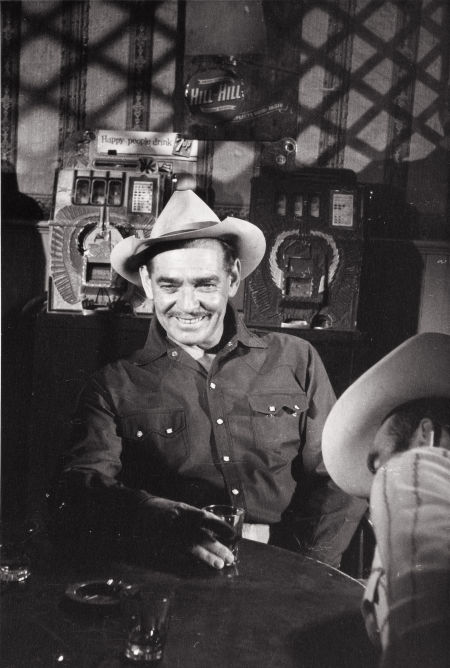
Lastly we have an article published after Clark’s death–Without Me, Clark Gable Never Would Be a Father. Quite a proclamation…
Here we have another article that is completely pointless. The author claims he took a father-to-be class with Clark. As you read it, you start believing it less and less. Clark Gable was in a Future Fathers class, learning how to bathe a baby and make formula? There is no way on earth. He claims that Clark “always came late” saying he caught up on set, which is ridiculous. Clark was extremely punctual and was irritated by those who were not. He would never consistently slip into a class late. Never mind the fact that the only film Clark made while Kay was pregnant was The Misfits, which filmed entirely on location in Reno.
Then there’s this whole sequence, that’s right out of a silly comedy movie:
[Clark asked] “But I wonder if I can ask you a big favor?”“Shoot.”
“It says in the book we ought to make a test run to the hospital, just to see how long it’ll take us when the day actually comes.”
“Sure,” I answered. “I already did. It takes me exactly twelve minutes and twenty-two seconds from my place to the hospital.”
“I didn’t have your guts,” he admitted. “I got in the car, but I was so nervous I couldn’t even turn the ignition. I kept imagining Kay beside me in the front seat—the real thing this time—and I froze up. Petrified. Couldn’t move. Could you…would you…make the dry run with me? I don’t know who else to ask. My friends would laugh at me. You’re a Future Father, too, and…”
“Sure,” I said, “sure. We’ll go right now, get it over with before the final quiz next week.”
I followed Clark’s station wagon to his house, parked my car there and climbed in with him. We synchronized our watches and away we went, screeching along the highway that led from his San Fernando Valley home to the hospital.
A siren screamed in the distance behind us. Clark immediately pulled over to the curb. “Might be an ambulance taking a woman to the hospital to have a child,” he said earnestly. “Gotta give ‘em lots of room.”
It was no ambulance! A police motorcycle pulled across our path, and an officer came towards us, ticket-book in hand. “Going to a fire, Mr. Gable?” he asked. “You were doing 80—on curves.”
“We’re going to the hospital,” Clark blurted out. “We’re going to have a baby.”
The officer looked at me, then he looked at Clark, then he grinned. “Congratulations,” he said. “Which one is the mother?”
I talked fast, telling him what we were doing and why we were speeding. At first, he shook his head, he wasn’t buying any wild stories. Clark reached inside his jacket pocket, pulled out his beat-up copy of the Future Fathers’ class brochure, and started reading out loud. “Fathers-to-be are advised to make a test run to the hospital in order to clock…”
“Okay, okay. I got it,” the cop said. “Let’s go!”
One second later we were roaring along behind a motorcycle escort. When we pulled up in front of the hospital, Clark and I checked our watches: twenty-four minutes on the dot. “Not counting the time we’d pulled over to the side of the road,” he added.
The policeman gave Clark his name, and the phone number of the station closest to where Clark lived. “When your wife’s starting for the hospital, phone us and yell,” he said. “One of the boys will come fast and clear the way for you.”
Ridiculous on many levels–one of which being that because of Kay’s heart problems and previous emergency cesareans, she was already scheduled to have a c-section, had the date set and everything. That’s just one of the implausible aspects to this tale. Oh, but turns out that indeed this entire article is pointless because at the end:
Miss Phillips called us to order and announced that we’d all passed the final quiz. Then there was a little ceremony where each of us fathers was called to the front of the room and presented with a small diploma. The first guy up said a few words of thanks to Miss Phillips, loud enough for everyone else to hear, and after that each of us did the same thing.
Clark’s turn was almost last. When Miss Phillips gave him the diploma, he sort of wiped his eyes on his sleeve. “Thanks,” he said in a low, firm voice. “Without the help of my good and best friend”…and he came over, and put his arm around me and patted me on the back…
…My wife was patting my back, shaking me vigorously. “Wake up,” she was hollering, “wake up.”
“What’s the matter?” I mumbled, still asleep. “Is it time to go to the hospital?”
“Not for three months yet,” she answered, snapping on the night light. “You’ve been talking in your sleep…say, you never told me you knew Clark Gable…” I told her I didn’t, and that it was just what I’d been reading in the papers. But she still doesn’t believe me to this day.
So the whole article was fiction, which it doesn’t admit until the end. Pointless. But hey, if you want to read it, here it is.
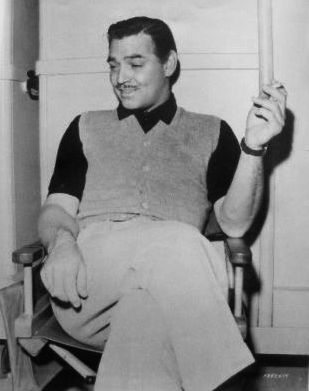

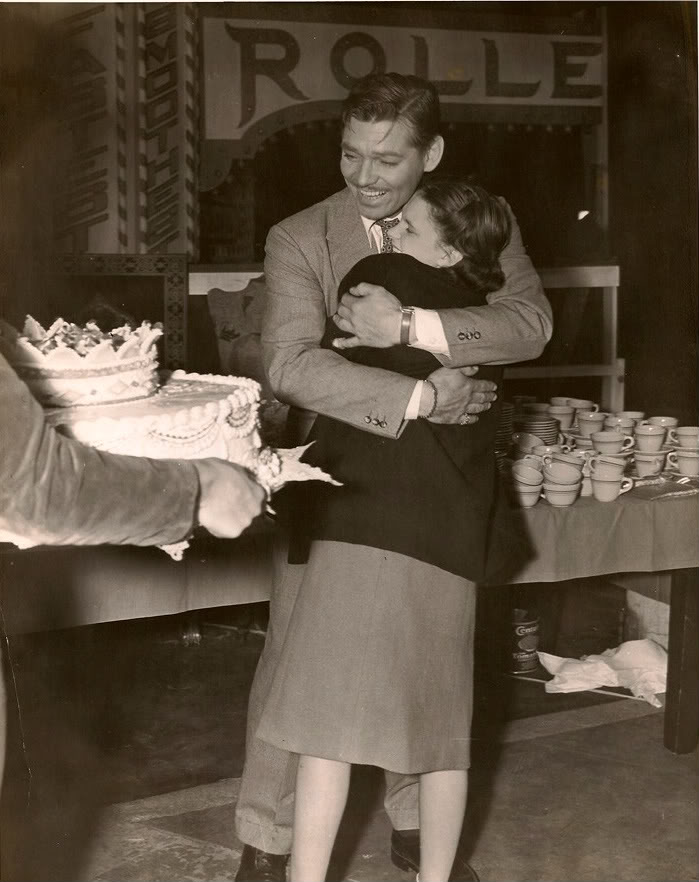

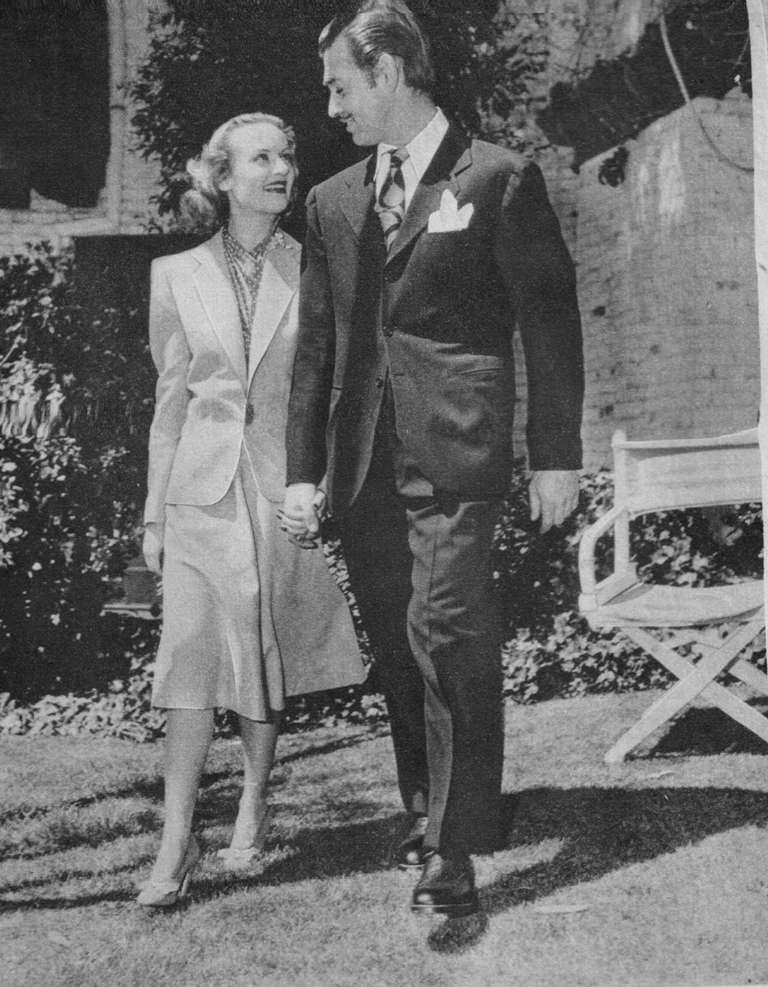
One Comment
Dan
OMG, your commentary here has me laughing Clark going to fatherhood classes? Nope. Clark faithful to Ria? Nope. Carole would never marry an actress? Nope. I mean, people really were so naive in those days to believe this publicity. I guess that’s one of the good things about the advent of technology. Or maybe, fans were better off in those days when there was still that mystique about Hollywood and our idols…
Clark going to fatherhood classes? Nope. Clark faithful to Ria? Nope. Carole would never marry an actress? Nope. I mean, people really were so naive in those days to believe this publicity. I guess that’s one of the good things about the advent of technology. Or maybe, fans were better off in those days when there was still that mystique about Hollywood and our idols…